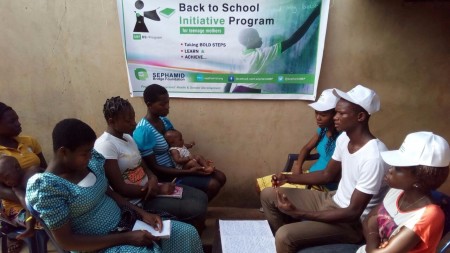A non-governmental organisation is calling on all to come forward and join hands to improve life chances for young adolescent girls in rural communities in Ekiti state, southwest Nigeria. Sephamid Bridge Foundation (SBF) aims to help teenage mothers to own their future and achieve their greatest potentials.
With 2 million girls who are 14 or younger and many of whom suffer grave long term health and social consequences from pregnancy such as obstetric fistula and an estimated 70,000 adolescents in developing countries die every year from complications during pregnancy and childbirth, Sephamid Bridge Foundation unveiled her Back to School initiative (BSi) programme for teenage mothers in Ekiti communities. The initiative aims to enhance human development through encouraging young mothers to embrace education and be empowered and have access to job opportunities. At the kick off of the programme at Ewu-Ekiti, a rural community located Ilejemeje Local Government, the purpose of the programme was immediately made known by the coordinator, Mr Dayo Ayeni said that SBF is an all-inclusive NGO that focuses on adolescent health and gender development.
He went further to explain that, SBF have in-school and out of school programme. “The in-school programme is where adolescent are educated and sensitized on the right health services and practices. Since lack of such health information places them at the risk of getting unwanted pregnancy, abortion, STIs, HIV/AIDs and the likes”, he said.
The programme is also to enable them to re-establish their dreams of becoming role models to their children as well as becoming productive members of their society, an Assistant Director in public health representing ministry of health, Mrs Adewemimo, was very impressed about the initiative of Back to School. In her words, Adewemimo said “It is a laudable programme that should be supported by all stakeholders and programme should not be limited to Ilejemeje LG alone but should be extended to other Local government in the state”.
“Too often, society blames only the girl for getting pregnant,” said UNFPA Executive Director Babatunde Osotimehin. “The reality is that adolescent pregnancy is most often not the result of a deliberate choice, but rather the absence of choices, and of circumstances beyond a girl’s control. It is a consequence of little or no access to school, employment, quality information and health care.”
The report, Motherhood in childhood: facing the challenge of adolescent pregnancy, seeks to offer a new perspective on teenage pregnancy, looking not only at girls’ behaviour as a cause of early pregnancy, but also at the actions of their families, communities and Governments.
SBF promotes lifelong skills and seeks to change attitude in society so girls are encouraged to stay in school and help young mothers to have better support system.
Early pregnancy takes a toll on a girl’s health, education and rights. It also prevents her from realizing her potential and adversely impacts the baby. A country’s economy is also affected by teenage pregnancies as adolescent mothers are prevented from entering the workforce.











